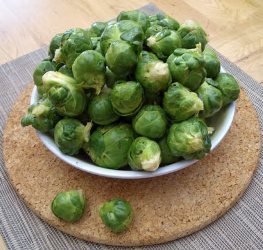 We all know of Thanksgiving as a day of gluttony. I mean, a day of giving thanks for the people we love. Yes, that’s it. But in between bouts of gratitude, there is usually a large, figure-unfriendly meal involved with the national holiday.
We all know of Thanksgiving as a day of gluttony. I mean, a day of giving thanks for the people we love. Yes, that’s it. But in between bouts of gratitude, there is usually a large, figure-unfriendly meal involved with the national holiday.
Thanksgiving also kicks off the winter holiday season, which can be a season of sweets, treats and indulgences. To keep yourself from ditching your diet plan on Day 1 of the holiday season, make sure there are plenty of vegetables to go around on your Thanksgiving table.
Brussels Sprouts: The tiny green orbs might have a reputation for being less than favorable, but they also deliver a sweet, nutty flavor that is hard not to like. Shred the fiber-rich veggies into a salad with apples and raisins – the sweet fruit elicits the natural flavor of the sprouts. Toss them in your favorite vinaigrette and you have one side dish ready to go without even using the oven.
Yams or Sweet Potatoes: People often confuse yams with sweet potatoes but they’re actually not one and the same. Sweet potatoes are indigenous to South America and have moist, sweet skin that comes in a variety of colors: white, orange and purple, to name a few. Yams, which hail from Africa, are white-fleshed, starchy tubers with dry, textured flesh. If you’re still confused, there is a reason for that: some agriculture importers use the two terms interchangeably.
Squash: If you’re cutting back on carbs this year, squash is a great substitute for your favorite grain-based dishes. For instance, spaghetti squash has long, thin strands that can be prepared like pasta and is rich in Vitamin A, potassium and dietary fiber. Prepare it as you would spaghetti with your favorite sauce or fixings.
Parsnips: You’ve probably seen parsnips in the grocery store and thought they looked a lot like carrots. You’re not wrong; parsnips are root vegetables that are typically white or beige – lighter than carrots – and can be enjoyed in soups, stews or roasts. Nutritionally, parsnips are high in potassium and dietary fiber, so eat up, guilt-free.
Swiss Chard: A green leafy vegetable that closely resembles spinach, Swiss chard is a rich, dark, leafy green packed with phyto-nutrients that may offer antioxidant and anti-inflammatory benefits. Swiss chard can be sauteed or cooked into casseroles for added flavor and nutrient boost.
